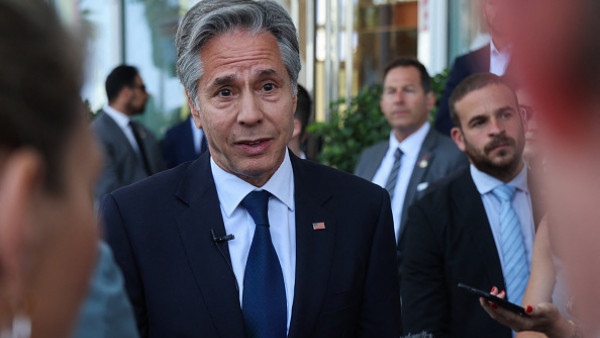Blinken has made eight visits to the region following the outbreak of the war in Gaza [Getty/file photo]
US Secretary of State Antony Blinken pushed on with a Middle East crisis tour Tuesday to promote a Gaza ceasefire plan as the country’s military offensive continued to ravage the territory.
Visiting Israel, Blinken said that Prime Minister Benjamin Netanyahu had “reaffirmed his commitment” to the truce proposal and that Hamas’s broad welcome for a UN Security Council vote backing it was a “hopeful” sign.
Blinken, on his eighth Middle East tour since the war broke out on October 7, also met two Israeli opposition leaders and was then headed to Jordan for a Gaza aid conference.
Amid the crisis diplomacy, Israel again bombed Gaza, killing several Palestinians, notably children, as Gaza’s latest death toll showed an increase in casualties.
Israeli forces carried out fresh strikes, with hospital sources reporting several Palestinians killed in the centre of the territory.
Israel has faced an international outcry over the spiralling death toll in the war raging for over eight months, which saw 274 Palestinians killed during an Israeli special forces raid Saturday to rescue four hostages.
The UN human rights office was “profoundly shocked at the impact on civilians” of the raid in Nuseirat, said spokesman Jeremy Laurence, who added that it was also “deeply distressed” that hostages are still being held in Gaza.
Major powers on Monday voiced support for the ceasefire plan, first outlined by US President Joe Biden late last month, for a six-week truce and an exchange of Israeli captives for Palestinian prisoners.
The US-drafted resolution, which passed with only Russia abstaining, said it “welcomes” the plan, that Israel had accepted it and that it “calls upon Hamas to also accept it”.
Hamas said Monday it “welcomes” elements of the UN resolution, and also reaffirmed its willingness to cooperate with mediators.
However, Hamas has also insisted on a permanent ceasefire, while Netanyahu has maintained that Israel’s war aims remain to “eliminate Hamas”.
Netanyahu suffered a major blow on Sunday when Benny Gantz, a centrist former army chief, quit his war cabinet, mainly in protest at the failure so far to outline a plan for the post-war governance of Gaza.
On Tuesday, Blinken met Gantz as well as opposition leader Yair Lapid, both of whom have been highly critical of the right-wing premier and his conduct of the war.
Washington has also strongly pushed for a “day-after” plan for Gaza, promoted a governance role for Hamas’s rival, the Palestinian Authority, and urged steps toward a two-state solution.
Netanyahu and his far-right coalition partners strongly reject the idea of Palestinian statehood, arguing that it would pose a security threat to Israel and “reward terrorism”.
Blinken said on Tuesday “there has to be a clear political plan, a clear humanitarian plan to ensure that Hamas does not in any way, shape or form (remain) in control of Gaza and that Israel can move forward toward more enduring security”.
The Israeli army launched a devastating offensive on the Gaza Strip on October 7 in retaliation for Hamas’ cross-border attack. The Israeli military has killed at least 37,1664 Palestinians as of Tuesday, mostly women and children.
An Israeli siege has deprived Gaza’s 2.4 million people of most food, clean water, medicines and fuel and pushed many to the brink of starvation.
In Jabaliya in northern Gaza, Soad Al-Qanou said her young child Amjad is suffering from malnutrition.
“This war has destroyed our lives and turned them upside down,” she told AFP. “There is no food, no drink. There is siege and destruction everywhere.”
The future of Gaza, and ways to step up humanitarian relief, were to be discussed at a conference on the shores of the Dead Sea in Jordan on Tuesday, to be attended by UN agency chiefs, Blinken and Arab leaders.
Jordan’s foreign ministry said the meeting would discuss “preparations for early recovery and seek commitments for a collective and coordinated response to address the humanitarian situation in Gaza”.


